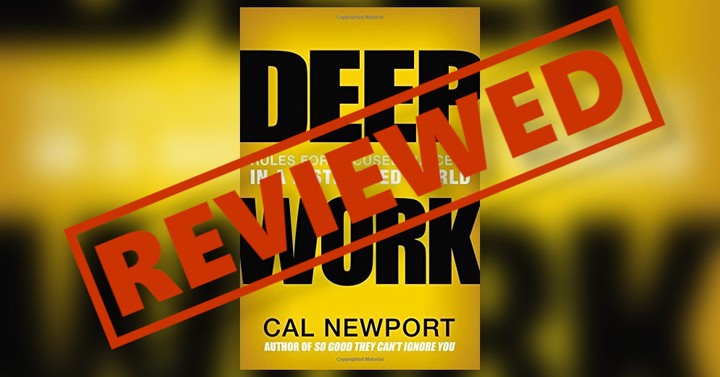Exploring depth in a shallow world – my takeaways from Deep Work

Deep work – it’s where the right stuff gets done. And it just happens to be the most enjoyable state of mind for a knowledge worker – that illusive state of flow. In his book, Deep Work, Cal Newport does a fantastic job laying out the What, Why’s and How’s of “deep work”.
“I’ll live the focused life, because it’s the best kind there is.”
Table of Contents
Synopsis of Deep Work
Deep Work makes the case that our attention has become increasingly fragmented, our work increasingly shallow. We’ve been converted into little more than human email routers at best, and at worst, social media update junkies.
To make things interesting, we are witnessing the transformation of our industrial economy into an information economy. Why does this matter? Well, for much of the workforce in an industrial economy, the ability to “go deep” is not important – once you’ve learned how to tighten bolt 5461, you can do it with your eyes closed while gossiping with your assembly line neighbor. In an information economy, however, the ability to go deep is critical. New information and methodologies barrage us every day on multiple fronts. Only those capable of rapid information assimilation survive. To learn quickly requires thought – deep, sustained, distraction-free thought.
So even as the value of deep work increases, our ability to go deep atrophies as we slosh through the shallows of email and Facebook, day after day, meeting after meeting, status update after status update.
The dark cloud of distraction has a silver lining
However, there is a silver lining. The information economy needs deep work capable workers, but everyone is on their phones! If you or I can manage to break the addiction and hone our attention, we’ll be in high demand.

Deep Work tips to implement
One of the nice things about Deep Work was its immediate practicality. It wasn’t just a bunch of theory and armchair neuroscience. Here are a few the suggestions I plan on executing.
Decide on a depth philosophy
The book outlines four different approaches toward deep work.
| Depth philosophy | Description |
|---|---|
| Monastic | Eliminate all shallow work from your life and be a productive hermit |
| Bimodal | Set aside entire weeks or months for nothing but deep work |
| Rhythmic | Carve out regular periods for deep work every day, e.g. the first two or three hours in the morning. |
| Journalistic | Drop into deep work whenever you find a free moment, like a journalist |
In my case, I work according to the “Rhythmic” depth philosophy, waking up early to focus on depth in the quiet wee hours of the morning. I’d like to try adding in a “journalistic” flair, if I can manage the discipline.
Further limit distracting websites
I already limit the time I spend on shallow and addicting-by-design websites like Twitter to a combined maximum of 10 minutes per day. Deep Work helped steel my resolve. Most browsers have extensions for this purpose.
It’s easy to underestimate the frequency of visits and the time spent on such websites, so leveraging a plugin to automatically kick you off when your time is up is a real boon.
Employ a daily shutdown ritual
The idea of a formalized “daily shutdown” ritual is a fantastic idea. When you’re right in the middle of something, it’s hard to put it down, but the shutdown ritual is like running git stash on your mental state. Just write it all down. It will be there for you in the morning.
Once you’ve shut down from work, stay that way. Don’t look at email. Don’t fire up a terminal, etc, etc.
I put a daily shutdown ritual into practice right away, and feel more relaxed in the evenings, and more rested the following day.
Execute like a business.
Ideas are cheap and abundant. Execution is where the difficulty lies and what separates dreams from reality. 4DX is a mindset and methodology to help you focus and execute where it matters most.
4DX stands for The Four Disciples of Execution. (See the table below for an overview.) There are some super ideas here, and of course there’s a book(affiliate link) .
Four disciplines of execution (4DX)
| Discipline | Description |
|---|---|
| Focus on the wildly important | Rather than get caught up in the “windstorm” of nonessential tasks, constantly remind yourself of your “Wildly Important Goal” (WIG), and focus all efforts on that |
| Focus on lead measures | Rather than focusing on unchangeable “lag” measures like gross sales, focus on “lead” measures like production |
| Keep score | Measure the lead measures and post them prominently |
| Create a cadence of accountability | Regularly review progress toward the WIG |
Heuristic for gauging the “shallowness” of an activity
How do I determine whether an activity is deep or shallow? The author presents an interesting exercise: Ask yourself how long it would take a smart college grad to do the work. If the answer is just a month or two, it’s a shallow task and your time could best be spent elsewhere.

But if I operate solo, who do I delegate to? If I determine that a task is shallow and thus unproductive, I will first attempt to rid myself of the task altogether. If that’s not possible, I’ll remind myself of the task’s low ROI and invest my time accordingly – absolute minimum viable output.
Beware the “any benefit” mindset
If social media is so distracting, why do so many use it? Due to the “any benefit” mindset, according to Cal Newport. Since there is some benefit to be gained by indulging in social media, people just adopt it without considering the “total cost of ownership”.

I plan on evaluating my choice of tools with this in mind. Do I use a tool just because it has “some” benefit, without stopping to consider the big picture?
In conclusion, Deep Work? Yeah it’s a good book. I highly recommend it. Stay deep, my friends, stay deep.
